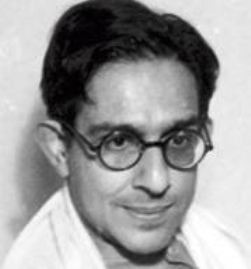Vaikom Muhammed Basheer is placed in the high altar of Malayalam literature as his literary creations are marked by the down to earth narration and sheer verities of the lives of common folk. This titan of Malayalam literature affectionately addressed as ‘Beypore Sultan’ has earned a distinctive mark of his own in Kerala as a humanist, writer, freedom fighter, and novelist. Along with him, P. Keshava Dev, Thakazhi Sivasankara Pillai, S.K. Pottekkatt and P.C. Kuttikrishnan constituted the Pentagon that inaugurated the Renaissance novel in Malayalam. Basheer wrote 13 novels and 13 collections of short stories apart from several articles, essays, and plays. Balyakalasakhi (Childhood Friend), the most enduring romantic tragedy novel penned by Basheer in 1944 has been translated into various Indian and global languages.
Wednesday 25 November 2020
The World Renowned Nose
Tuesday 24 November 2020
Shaper Shaped
Sunday 22 November 2020
A Pair of Mustachios
Mulk Raj Anand, the most celebrated Indian novelist is one among the trio of Indian Writing in English along with R. K. Narayan and Raja Rao. His works endeavored to portray the social realities of British India in the language of the colonial master. Anand witnessed the Gandhian Period in Indian politics and literature in Indian languages began echoing Gandhian principles and philosophy. This impact was evident in Indian writing in English as well. Mulk Raj Anand was most deeply impressed by Mahatma Gandhi and his ways of life. His works endeavored to portray the social realities of British India in the language of the colonial master.
He was a champion of the 20th-century Progressive Writers’ Movement. He had drafted the first manifesto of the literary association. A forerunner of Indian Writing in English, he earned an international repute early in his life. He was born in Peshawar and educated at the Universities of Lahore, London, and Cambridge. He has achieved international fame as a novelist as well as a short story writer. He has penned novels like The Untouchable, Coolie, The Sword and the Sickle, Two Leaves and a Bud, etc. His remarkable short story collections include Lajwanti and Other stories, The Barber’s Trade Union and Other Stories, etc. He has written comprehensively in multifarious fields such as politics, art, sculpture, Indian literature, freedom movement, Gandhian impact, and so on. The laurels and accolades for his literary contributions comprise International Peace Prize from World Peace Council, Sahitya Akademi Award, Padma Bhushan, and Leverhulme Fellowship.Mulk Raj Anand’s short stories unearth a deep sense of humour, simplicity of the village folk, pretensions of the people with the effective use of his creative language, and comic content. His “A Pair of Mustachios” is written in a humorous vein dealing with the funny clash that happens due to the upturned moustaches of Seth Ramanand, the grocer and money lender.
To read my full article, click https://www.boloji.com/articles/52091/mulk-raj-anand-a-pair-of-mustachios
Friday 20 November 2020
A Requiem to Mother Earth
Ottaplakkal Neelakandan Velu Kurup aka O.N.V. Kurup’s contribution in the literary sphere of Kerala is broadly esteemed for his finesse in poetry. He began his poetic career as a representative of the ‘Pink Era’ in Malayalam and his poetry is marked by the manifestation of highly evocative images of nature.
O.N.V. Kurup, a poet, lyricist, teacher, and inspiration for all has held generations in awe with his imaginative and intuitive skills, creativity, and poetic lingos. He was born on May 27, 1931, at Chavara, in Kollam District, where he completed his schooling. His first major effort in poetry began during his school days, which also saw his first published poem ‘Munnottu’ (Forward) in 1946, penned in the backdrop of his patriotic feelings. The poetic aspects of the epic, Adhyatma Ramayanam, and its style have had a major influence and impact later in his career as a poet.Honors and appreciations have always been a part of his life. Agni Salabhangal the poetic work by Mr. Kurup was awarded the Kerala Sahitya Akademi Award in 1971. He was also awarded the Kendra Sahitya Akademi Award in 1975 for his poem Aksharam. A noted poetic work of Mr. Kurup titled ‘Uppu’ won the Soviet Land Nehru Award in 1981 and also the Vayalar Rama Varma Award in 1982. He has also won the Kerala State film awards twelve times, for the best lyricist. He was awarded Padmashri in 1998, Jnanpith in 2007, and Padma Vibhushan in 2011. I was so touched by the verses of his renowned poem ‘A Requiem to Mother Earth’ (Bhoomikku Oru Charamageetham). He addresses the issues of ecological preservation and the unsympathetic ways in which landscape is commodified and divided up by human beings for egocentric motives. He urges human beings to be grateful to Mother Earth for nurturing and fostering them. O.N.V. points out that human beings are not affectionate to mother earth. He defines that mother Earth has fed human beings with her own milk by eliminating her greenery dress and the verdant hues. Even after drinking her milk, humans were not able to satiate their thirst and they began to suck her blood too. His poem is a dirge for mother Earth and the poet anticipates the death of our mighty Earth. He begins the requiem with an epigraph:
‘A song of praise
For this earth
For its surge of life
For poetry, the essence of its beauty…’






